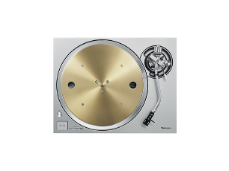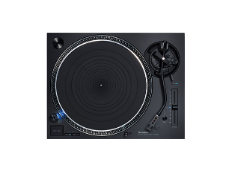
The Next Generation of Direct Drive Turntable Systems
The ΔΣ-Drive (Delta Sigma Drive) — A New Interpretation of Analogue Vinyl Sounds
In 1970, Technics developed the world’s first direct drive turntable.
Direct drive turntable systems helped to significantly improve issues with previous turntables, such as S/N ratios, and wow and flutter. Used by broadcasting stations for their outstanding performance and reliability, these turntables came to dominate the industry. In 2016, Technics developed the coreless direct drive motor, which helped to eliminate a mechanical issue known as cogging. Combining this motor with the latest digital rotational control technologies helped to realise a dramatic improvement in sound quality.
Technics has continued to engage in R&D to further improve the audio quality of analogue vinyl and better draw out the charms of the music, and as a result has successfully developed the ΔΣ-Drive, which boasts significant advancements over previous direct drives. This development marks the next generation of Technics’ direct drive turntable systems.
Evolution of Technics’ Direct Drive Turntable Systems
1st Generation - 1970 SP-10
The world's first turntable to use a direct drive motor

Technics' first direct drive motor
The direct drive motor used on the SP-10

2nd Generation - 1975 SP-10MK2
Equipped with a Quartz Lock to minimise speed deviations

3rd Generation - 2016 SL-1200G
Significant improvement in rotational performance through a coreless direct drive motor and digital control

Coreless Direct Drive Motor
The coreless direct drive motor helped to eliminate cogging issues

4th Generation - 2023 SL-1200GR2
Equipped with the new ΔΣ-Drive (Delta Sigma Drive) to eliminate micro-vibrations from the motor

4th Generation – 2024 SL-1300G
Grand-class turntable with Hi-Fi design featuring ΔΣ-Delta Sigma Drive

The ΔΣ-Drive (Delta Sigma Drive) is the Result of More Than 50 Years of Direct Drive Motor Development

Improved Sound Image Localisation for Richer Spatial Expression
The latest motor control systems utilise the PWM method. In the same way, Technics’ full digital amps utilise the PWM method to achieve high precision, low distortion output. Focusing on this common feature, to reduce minor rotational inaccuracies and minute vibrations from motor rotation, Technics developed the new ΔΣ-Drive using the high sound quality technologies it acquired from full digital amp development. In the world of turntables, where weight matters, this is a new approach to improving sound quality that focuses on signal processing.
The ΔΣ-Drive uses delta-sigma conversion technology to reduce errors in the drive signals, obtaining low distortion drive signals through highly precise PWM generation technology. It also helps to reduce the minor rotational inaccuracies and minute vibrations that cannot be picked up with wow and flutter or S/N ratios. Minute vibrations appear as reverse phase components in audio signals and obscure the sound image, but the ΔΣ-Drive reduces these vibrations to improve sound image localisation, enabling clear and high-quality spatial expression.

Comparison of Platter Vibrations in the ΔΣ-Drive and a Conventional System
The ΔΣ-Drive reduces the minute vibrations that are triggered by slight fluctuations in motor rotation. As a result, it helps to reduce vibrations on the surface of the platter, improving sound image localisation and enabling richer spatial expression.

Comparison of Audio Signal Spectral Waveforms in the ΔΣ-Drive and a Conventional System
Compared to the conventional system, the audio signal spectrum around 3 kHz becomes sharper, enabling clear playback with minimal rotational fluctuations.

*Measurement results for the SL-1200GR2
The Deciding Factor for Analogue Vinyl Sound Quality
Ideal Electromagnetic Conversion Performance
To improve sound quality when playing analogue vinyl, the cartridge’s ability to accurately trace the music information pressed into the record and convert it into electronic signals is paramount. This also requires excellent rotational accuracy with little or no vibrations from the motor.
The new ΔΣ-Drive from Technics boasts unparalleled rotational performance that is fitting for a new generation of direct drive turntables, which in turn has greatly improved the electromagnetic conversion accuracy of the cartridge. We encourage you to enjoy the outstanding vinyl sound from this new turntable system.







